
KAGAKU KOGAKU RONBUNSHU
Scope & Guideline
Advancing the Frontiers of Chemical Knowledge
Introduction
Aims and Scopes
- Chemical Process Engineering:
The journal explores various aspects of chemical process design, optimization, and analysis, including fluid dynamics, heat transfer, and mass transfer in industrial applications. - Material Science and Engineering:
Research on the synthesis, characterization, and application of advanced materials, particularly in relation to catalysts, adsorbents, and nanomaterials, is a core focus. - Environmental Engineering and Sustainability:
Papers often address environmental challenges, including CO2 capture, waste treatment, and sustainable resource management, highlighting the journal's commitment to green technology. - Computational Fluid Dynamics (CFD) and Simulation:
The use of numerical methods and simulations to model complex fluid behaviors and processes is a significant theme, aiding in the design and analysis of various systems. - Biochemical Engineering:
Research related to bioprocessing, including the cultivation of microorganisms and the extraction of bioactive compounds, reflects the journal's interest in the intersection of biology and chemical engineering.
Trending and Emerging
- Carbon Capture and Utilization Technologies:
There is a growing emphasis on research related to CO2 capture and conversion, indicating a strong focus on mitigating climate change impacts through innovative engineering solutions. - Nanotechnology in Material Science:
The application of nanotechnology in the synthesis and application of advanced materials has gained momentum, reflecting its importance in enhancing performance and efficiency in various fields. - Interdisciplinary Approaches to Chemical Engineering:
An increase in interdisciplinary research, particularly involving biology and chemistry, suggests a trend towards collaborative solutions that address complex engineering problems. - Advanced Simulation Techniques:
The rising use of sophisticated simulation techniques, including CFD and AI-driven models, indicates a shift towards more accurate and predictive analyses in chemical processes. - Sustainable Processing and Waste Management:
Emerging themes include innovative methods for waste treatment and resource recovery, aligning with global sustainability goals and the increasing importance of environmental responsibility.
Declining or Waning
- Traditional Chemical Synthesis Methods:
There has been a noticeable decrease in papers focusing on conventional chemical synthesis methods, likely due to a growing interest in more sustainable and innovative synthesis techniques. - Basic Heat Transfer Studies:
While heat transfer remains relevant, the focus on basic studies without application to new technologies or processes has waned, as researchers seek more applied and interdisciplinary approaches. - Single-Factor Experimental Designs:
Research employing single-factor experiments is less common now, shifting towards more complex factorial designs or computational approaches that reflect real-world interactions. - Static Analysis of Chemical Processes:
Static analysis methods are increasingly being overshadowed by dynamic modeling and real-time simulation techniques, which provide more relevant insights into process behavior.
Similar Journals
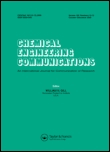
CHEMICAL ENGINEERING COMMUNICATIONS
Fostering Collaboration in Chemical Engineering Excellence.Chemical Engineering Communications, published by Taylor & Francis Inc, is a distinguished journal within the realms of Chemical Engineering and Chemistry. With an ISSN of 0098-6445, this journal plays a pivotal role in disseminating innovative research, critical reviews, and insightful discussions that encompass a broad spectrum of topics in these fields. The journal boasts a commendable Q2 ranking in the 2023 category of chemical engineering and general chemistry, reflecting its significant contribution to the scientific community. Operating under a rigorous peer-review process, the journal attracts high-quality submissions from global researchers. Although currently not an Open Access journal, it provides extensive archive access for users interested in exploring past advancements from its inception in 1973 through to 2024. With a commitment to advancing knowledge and fostering collaboration among academia and industry, Chemical Engineering Communications remains an essential resource for professionals and students aiming to stay abreast of the latest developments in chemical sciences.
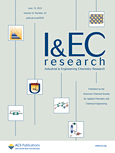
INDUSTRIAL & ENGINEERING CHEMISTRY RESEARCH
Elevating Industrial Chemistry to New HeightsINDUSTRIAL & ENGINEERING CHEMISTRY RESEARCH, published by the American Chemical Society, is a pivotal journal that disseminates high-quality research in the fields of Chemical Engineering, Chemistry, and Industrial and Manufacturing Engineering. With an impressive impact factor, this journal ranks in the top quartile (Q1) across multiple categories, reflecting its significance and influence within the scientific community. Since its inception in 1987, IECR has provided a platform for researchers, professionals, and students to publish innovative findings that advance the understanding and application of engineering chemistry. Though it operates under a subscription model, the journal continues to foster collaboration within the field, inviting contributions that span theoretical advancements, experimental studies, and practical applications. Whether you are engaged in academia or industry, IECR serves as a vital resource for staying abreast of the latest developments in chemical and engineering research.
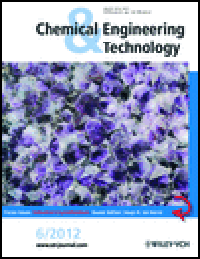
CHEMICAL ENGINEERING & TECHNOLOGY
Advancing the Frontiers of Chemical EngineeringChemical Engineering & Technology is a prestigious journal published by Wiley-VCH Verlag GmbH, focusing on the evolving field of chemical engineering and its related disciplines. With an ISSN of 0930-7516 and E-ISSN of 1521-4125, the journal has established a robust platform for researchers and practitioners to share pioneering studies and innovative technologies within the field. Classified in the second quartile (Q2) across multiple categories such as Chemical Engineering, Chemistry, and Industrial and Manufacturing Engineering, it holds an impressive rank in the Scopus database, indicating its significant contribution to the academic community. The journal's commitment to advancing knowledge is reflected in its extensive convergence of research from 1987 to 2024, providing a comprehensive archive of scholarly work. Researchers, professionals, and students benefit from the latest insights and findings, enriching the dialogue around chemical processes and methodologies. Though it operates under a traditional subscription model, the accessibility of this journal is crucial for those engaged in both theoretical and applied aspects of chemical engineering.
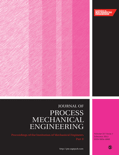
PROCEEDINGS OF THE INSTITUTION OF MECHANICAL ENGINEERS PART E-JOURNAL OF PROCESS MECHANICAL ENGINEERING
Advancing the Frontiers of Mechanical EngineeringPROCEEDINGS OF THE INSTITUTION OF MECHANICAL ENGINEERS PART E - JOURNAL OF PROCESS MECHANICAL ENGINEERING is a leading peer-reviewed journal published by SAGE Publications Ltd, dedicated to the field of mechanical and process engineering. With a strong emphasis on the latest research and developments, this journal covers a wide range of topics that are vital for advancing the understanding and application of mechanical processes in engineering. Holding an impressive Q2 ranking in both Industrial and Manufacturing Engineering and Mechanical Engineering categories for 2023, it promotes high-quality scholarly articles that are instrumental for researchers and professionals alike. The journal's historical range from 1989 to 2024 showcases its commitment to consistently delivering vital insights to the engineering community, making it an essential resource for those seeking to stay at the forefront of the discipline. Although it does not currently offer open access options, the impact factor and relevance of the journal ensure that it remains a valuable platform for disseminating significant findings in the field.

CHEMICAL AND PETROLEUM ENGINEERING
Catalyzing Knowledge in the Energy SectorChemical and Petroleum Engineering is a prestigious academic journal dedicated to the advancement of knowledge in the fields of chemical engineering and petroleum technologies. Published by Springer, this journal serves as a vital resource for researchers, professionals, and students interested in the intricate processes and innovations that drive these industries. With an ISSN of 0009-2355 and an E-ISSN of 1573-8329, it has established a notable presence since its inception in 1965. Throughout its converged years, the journal has continually published impactful research that contributes to sustainability and efficiency within the sectors. Although it holds a Q3 ranking in Chemical Engineering and Fuel Technology and a Q4 ranking in Energy Engineering and Geochemistry, it is a noteworthy platform for emerging studies, fostering connections among scholars. Readers will find a wealth of information and ideas, but please note that this journal does not currently offer open access options. For those passionate about chemical and petroleum engineering, this journal is an essential part of staying informed and engaged with the latest scientific advancements.
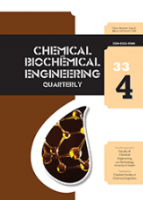
CHEMICAL AND BIOCHEMICAL ENGINEERING QUARTERLY
Advancing Knowledge in Chemical and Biochemical EngineeringCHEMICAL AND BIOCHEMICAL ENGINEERING QUARTERLY, published by the Croatian Society of Chemical Engineering Technology, is a distinguished open-access journal that has been providing a platform for the dissemination of innovative research since its inception in 1987. With a focus on the fields of biochemistry and chemical engineering, this quarterly journal addresses a wide array of topics, including process chemistry and technology, making significant contributions to both academia and industry. Despite its current positioning in the Q4 category for biochemistry and Q3 for miscellaneous chemistry and process chemistry in 2023, the journal continues to strive for greater impact, catering to researchers, professionals, and students alike. Its open-access model, in place since 2001, ensures that cutting-edge research is accessible to a broad audience, fostering collaboration and knowledge sharing within the scientific community. By promoting high-quality research and providing insights into the latest advancements, Chemical and Biochemical Engineering Quarterly remains an essential resource for those involved in the chemical and biochemical engineering disciplines.

Revista Mexicana de Ingenieria Quimica
Advancing the Frontiers of Chemical EngineeringRevista Mexicana de Ingenieria Quimica, published by UNIV AUTONOMA METROPOLITANA-IZTAPALAPA, serves as a vital academic platform for the dissemination of innovative research in the field of chemical engineering. Established in 2008, this journal has become a respected source of knowledge, reflecting the ongoing advancements and challenges in the discipline. As a Q3 ranked journal in the field of Chemical Engineering, it holds a significant position with a meaningful impact amongst its peers, showcasing diverse aspects of chemical engineering and applications. With contributions from various scholars, it actively engages the global research community and promotes collaboration among professionals and students alike. While currently not designated as an open-access publication, the journal is accessible through institutional subscriptions, ensuring that valuable insights and findings reach a broad audience. Researchers looking to stay at the forefront of chemical engineering would benefit immensely from the cutting-edge studies and reviews published in Revista Mexicana de Ingenieria Quimica.

CHEMIE INGENIEUR TECHNIK
Innovating Solutions for Tomorrow's Chemical Challenges.CHEMIE INGENIEUR TECHNIK, published by WILEY-V C H VERLAG GMBH, stands as a significant academic journal in the fields of Chemical Engineering, Chemistry, and Industrial and Manufacturing Engineering. With an ISSN of 0009-286X and an E-ISSN of 1522-2640, this esteemed journal has been contributing to the body of knowledge since 1949 and plans to continue its legacy until 2024. Notably, the journal holds a Q2 quartile ranking in 2023 across various categories, illustrating its recognized impact and relevance within the scientific community, with Scopus ranks indicating it falls within the top 60th to 51st percentiles of its respective fields. Although currently not open access, CHEMIE INGENIEUR TECHNIK provides readers with comprehensive insights into contemporary research, technological advancements, and practical applications, making it an essential resource for researchers, professionals, and students who are keen to stay abreast of developments in chemical processes and engineering advancements.

INDIAN JOURNAL OF CHEMICAL TECHNOLOGY
Transforming Ideas into Solutions in ChemistryThe Indian Journal of Chemical Technology, published by the Natl Inst Science Communication-NISCAIR, is a pivotal platform for the dissemination of innovative research in the field of chemical technology. With an ISSN of 0971-457X and an E-ISSN of 0975-0991, this journal has been serving the academic community since its inception in 1994, and is set to continue through 2024. The journal holds a Q4 ranking in both the Chemical Engineering and Chemistry categories as of 2023, though it showcases a significant breadth of research, making it a valuable resource for both emerging and established scholars. Although it currently operates without an open-access model, the journal aims to facilitate knowledge exchange through rigorous peer-reviewed publications, allowing researchers and professionals to stay updated with the latest advancements and practices in chemical technology. Located in New Delhi, India, the journal not only contributes to national scientific dialogue but also plays a key role in the global conversation around chemical sciences by addressing unique challenges and innovations pertinent to the region.

Interfacial Phenomena and Heat Transfer
Unveiling the Complexities of Interfacial DynamicsInterfacial Phenomena and Heat Transfer is a leading academic journal published by BEGELL HOUSE INC that has rapidly established itself as an essential resource for scholars and industry experts in the fields of engineering, fluid flow, and chemical processes. With an ISSN of 2169-2785 and E-ISSN 2167-857X, this journal focuses on the critical interdisciplinary aspects of heat transfer and interfacial phenomena, offering insights that span across mechanical engineering, chemical engineering, and physical sciences. Despite its relatively recent inception in 2017, it has garnered respectable recognition, with a 2023 Scopus rank placing it in the Q3 category within the disciplines of Engineering (miscellaneous) and Fluid Flow and Transfer Processes, making it a pertinent publication for those interested in cutting-edge research. As researchers and professionals navigate the complexities of interfacial dynamics, Interfacial Phenomena and Heat Transfer serves as a pivotal platform, publishing high-quality, peer-reviewed articles that aim to advance knowledge and stimulate further investigation in this increasingly vital domain.